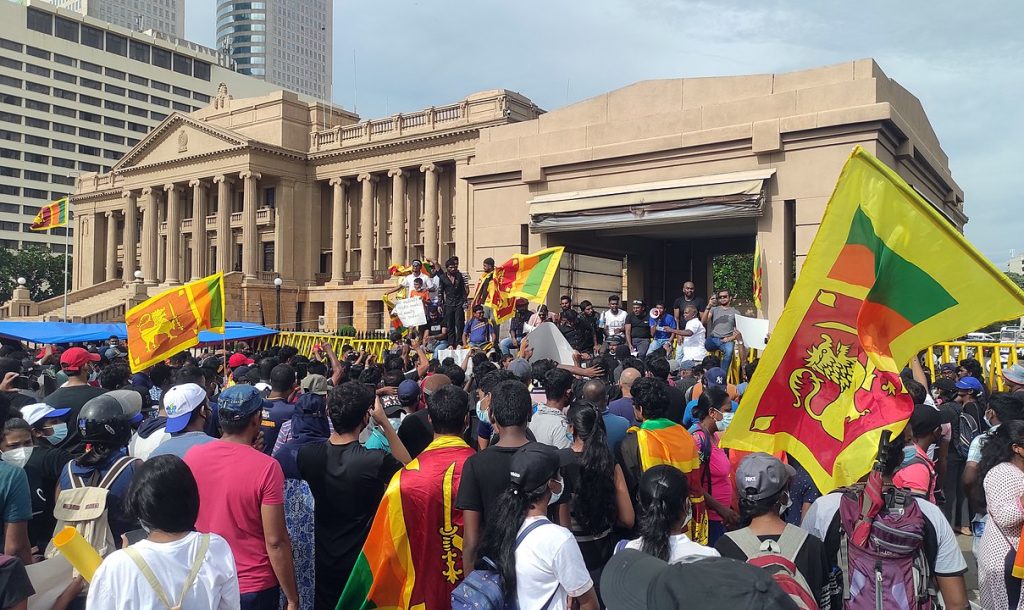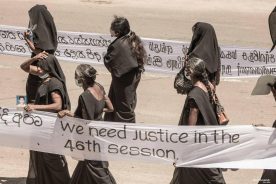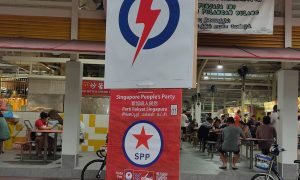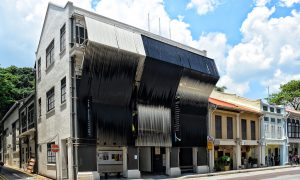Singapore has come under scrutiny since the ousted ex-president of Sri Lanka, Gotabaya Rajapaksa, arrived in the country on 14 July. The arrival followed days after Rajapaksa was seen fleeing Sri Lanka in a military airplane heading to Maldives. Singapore then granted entry on a short-term visit pass (STVP) as he was on a “private visit” and did not request asylum.
Over the last couple of months, Sri Lanka has been on the brink of economic and political chaos and Rajapaksa’s government has faced widespread backlash, leading to violent protests against its economic policies and mismanagement. Gotabaya himself has been accused of overseeing corruption that led to the country going bankrupt in the worst financial crisis since Sri Lanka gained independence.
Though the Immigration and Checkpoints Authority (ICA) has confirmed that Rajapaksa left Singapore on 11 August, his month-long stay in Singapore has fuelled debate, both online and offline. These comments range from disappointment at Singapore’s decision to grant Rajapaksa a visa in the first place, to expressions of indignation from the Sri Lankan diaspora. Members of Parliament, Yip Hon Weng and Gerald Giam, have raised parliamentary questions on two separate occasions regarding Rajapaksa—with the government maintaining that no special privileges, immunity or hospitality were accorded to the ex-President and his wife during their stay in the country.
The Rajapaksa clan have long dominated the political landscape of Sri Lanka, holding fort for almost two decades. Ex-Prime Minister Mahinda Rajapaksa, seen as the patriarch, enjoyed immense popularity in the country, especially with the majority Sinhalese-Buddhist population. Mahinda Rajapaksa, was once hailed as hero for bringing the country out of a 26-year conflict against The Liberation Tigers of Tamil Eelam (LTTE)—a militant separatist group fighting for an independent homeland for Tamils—despite allegations of discrimination against minorities and other human rights abuses.
The Rajapaksa regime: navigating the victor’s peace
The climate of increased repression is having a chilling effect on CSOs (civil society organisations), especially those with a human rights focus.
Gotabaya, who was elected President in 2019, has since been accused of stirring up anti-Muslim sentiment in the Buddhist-majority country. For their governance Mahinda, and Gotabaya, have both relied heavily on a form of muscular Sinhalese Buddhist nationalism—an ideology that perpetuates Sinhalese Buddhist supremacy—to stay in power. This brand of majoritarian politics and religious nationalism have stoked tensions along ethno-religious lines and have increased targeted crackdown against the Tamil and Muslim communities. Consequently, anti-Tamil and anti-Muslim sentiments have been a part of the normative political discourse in Sri Lanka, putting these minority communities in a precarious position.
While Rajapaksa’s arrival in Singapore was handled as an administrative manner, the legacy and symbolism of the Rajapaksa regimes have not escaped the attention of Singaporeans, especially those belonging to the Sri Lankan diaspora.
On 16 July, a last-minute protest was held at the Speakers’ Corner in Hong Lim Park against Singapore’s decision to allow Rajapaksa into the country. Although it drew an audience of one, the turnout was not reflective of the resonance of the issue.
Given the violence that Rajapaksa’s regime inflicted on Sri Lanka’s Tamil and Muslim populations, some individuals from the Sri Lankan diaspora in Singapore, as well as individuals of Tamil descent expressed their disappointment at the government’s decision to grant Rajapaksa entry into the country, and their subsequent decision to extend his stay. Some have pointed out his legacy of discriminatory and violent politics, and how his regime stands in stark contrast to the values that multicultural Singapore stands for, especially since the city state often takes a zero-tolerance stance against divisive politics and ideologies. This position can be seen in action in the government’s denial of entry to Indonesian preacher Abdul Somad Batubara whose “extremist and segregationist” teachings are “unacceptable in Singapore’s multi-racial and multi-religious society”, and the banning of American pastor Lou Engle who made Islamophobic posts on his blog. More recently, the movie “The Kashmir Files” was banned in Singapore because of fears that its one-sided depiction of the conflict in Kashmir may fan anti-Muslim rhetoric, cause enmity and disrupt harmony.
Furthermore, following a police report lodged in Singapore calling for the state to investigate Rajapaksa for money laundering, an online petition was created. The creator of the petition stated that Singapore is a country “with rule of law”, mirroring other posts by netizens pointing to the contradictions in Singapore’s strong position against corruption and the granting of Rajapaksa’s stay. By 28 July, it had garnered more than 5000 signatures.
Rajapaksa’s arrival has evoked the desire to defend Singapore’s social pluralism and rule of law, emphasising not only the value placed on social diversity and Singapore’s strong legal institutions, but also on concepts of justice in general, and of justice vis-à-vis diversity in Singapore.
As such, beyond Rajapaksa, the politics of symbolism is useful when attempting to understand the values that Singapore espouses and represents in the imaginaries of its diaspora and minority communities. Within this are the values and notions of justice that the state is expected to defend. What emerges is a conception of what is owed, inspiring reflection on Singapore’s social compact as not just the responsibility individuals in society owe to one another, but also what the state owes to society.
Already, there is recognition that refreshing Singapore’s social compact will need to account for changing attitudes around identity and the values of multiculturalism, as “each generation has a different perspective on racial harmony” and thus, a different version of what justice vis-a-vis diversity encompasses. Despite the legality of Gotabaya Rajapaksa’s stay in Singapore, the divisiveness and violence that the Rajapaksas have come to represent is something to consider. Given the city state’s careful management of diversity and inter-group relations, the sentiments, affinities, and conceptions of justice amongst minority and diaspora communities should factor into such decisions—or at the very least, state communication surrounding such decisions.
 Facebook
Facebook  Twitter
Twitter  Soundcloud
Soundcloud  Youtube
Youtube  Rss
Rss 



